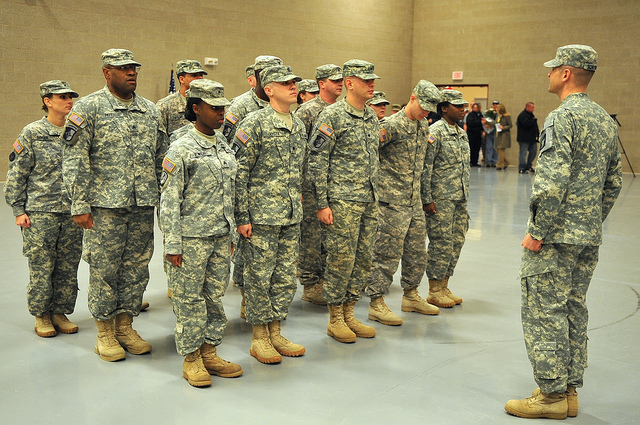
Can writing bridge the gulf between veterans and civilians? (minnesotanationalguard / Flickr)
“‘Did you kill anybody?’”
Most Americans will never experience war firsthand, and author and veteran Phil Klay is recounting this question—which veterans like him often receive—in order to illustrate the point. Unlike people in other parts of the world, Americans’ “relationship to war,” he says, “is totally defined by our radical distance from it.”
The early evening air is damp and heavy outside the impressive headquarters of the Brooklyn Historical Society on Pierrepont Street, and the AC inside is surging, causing the spotlights overhead to sway and the projection screen behind the seated panelists to flap lazily.
Klay, who served with the Marine Corps in Iraq, is the author of the 2014 National Book Award–winning short story collection Redeployment. He’s one of four writers brought here by moderator Brandon Willitts, co-founder of the nonprofit Words After War, to discuss what Willitts sees as the widening gulf between veterans and civilians, and the role writing can play in bridging it. Or, as Klay frames the matter, “What is the contract that we have between citizen and soldier?”
Two other panelists are also veterans: Matt Gallagher (Army/Iraq) and Maurice Decaul (Marines/Iraq). The lone civilian is Sara Nović, whose 2015 novel Girl at War explores growing up in Croatia during the turmoil of the early 1990s.
As a result, the usual writing panel topics—creative process, readership, authorial voice—though discussed, don’t receive their customary airtime. And when it comes to the “contract” Klay highlights, there isn’t much disagreement among the speakers: with war, everyone has a responsibility. As well as a voice.
“The wars don’t belong just to the soldiers,” says Decaul, a poet, essayist, and playwright. “It belongs to every single one of us.” Klay agrees: “You don’t have to be a veteran to be concerned with issues of war and peace.”
Gallagher, author of the 2010 memoir Kaboom, goes further. Being concerned and staying engaged means taking action. And taking action—sometimes—means writing.
“Push the fuck back,” he entreats, leaning into the mic, “whether you’re a veteran or civilian—I don’t care! And write about it!”
The audience applauds enthusiastically.
But how do we push, exactly?
As writers, this group has a unique set of tools for doing that—for keeping questions about war and the military, and the public’s relationship to both, active in the national discourse. Nović says writing about war can, among other things, be “an opening door—to give people the capacity for empathy.”
But there’s also a general consensus that empathy alone isn’t enough.
“It’s easy to feel sympathetic toward somebody who’s gone through a hard time,” Klay concedes. “But the real question is, What obligations do I have? What responsibility do I have? Do I feel implicated in this or not?”
Of course, these are neither easy nor comfortable questions, and there are no simple answers. But one thing emerges more clearly: If the larger society—both veterans and civilians—is to feel “implicated,” we’ll have to keep reading what authors like Klay, Gallagher, Decaul, and Nović are writing.
That’s their side of the contract. As Gallagher puts it, “The work is preeminent. The work has to be good.” It needs to be good in order to be read.
And this is where we come in as readers—our side of the contract. Reading isn’t fighting, and it isn’t writing, either. But it’s a start. And it’s a pretty good way to learn how to ask the right questions.
.
 David Speer is a writer and performer based in New York City.
David Speer is a writer and performer based in New York City.
